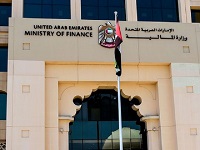 The UAE’s Ministry of Finance has announced five major projects to improve government financial work aimed at further enhancing future readiness.
The UAE’s Ministry of Finance has announced five major projects to improve government financial work aimed at further enhancing future readiness.
According to The National, they include local supply strategies, transparency in climate data, corporate tax, public-private partnership and an e-billing system.
The projects are in line with the country’s ‘We the UAE 2031’ strategy, which outlines the development path for the next decade, and are part of the initiatives under the digital government strategy, the ministry said on Tuesday.
The next stage of government work requires defining priorities, making qualitative transformations, managing resources and budgets, and implementing projects that seek to achieve the UAE’s goals, said Mohamed Al Hussaini, Minister of State for Financial Affairs.
The ministry aims to establish effective partnerships with the private sector to improve government services and finance projects.
The five projects include:
- Supply strategy of the federal government
The ministry aims to incorporate new categories of suppliers for the federal government to support national economic growth and diversify the supplier base.
The move is hoped to improve the quality of services and products for federal procurement at “competitive prices” and ensure higher adoption of the National In-Country Value Programme’s standards, the ministry said.
The National ICV Programme, launched in 2021, redirects spending into the UAE economy. It aims to enhance the competitiveness of UAE products in regional and international markets, attract foreign investments, support the UAE’s Fourth Industrial Revolution programme and incentivise the technological transformation of the industrial sector.
Last year, the programme redirected Dh53 billion ($14.4 billion) into the economy, a 25 per cent increase compared with the previous year.
- Transparency in climate and environment spending data
Under the second project, the ministry will submit data related to state-level government expenditure on the climate and environment to the International Monetary Fund.
The data will also be published on the Climate Change Indicators Dashboard, which measures the impact of national climate policies and spending on macroeconomic sustainability and transparency.
Users of the dashboard can assess how economic and financial activities and government policies are linked to climate change and, on a wider scale, the environment.
The project is being launched as part of the UAE’s year of sustainability in 2023 and as it prepares to host Cop28 later this year.
- Public-private partnership
The ministry will establish an advanced mechanism for organising partnership projects between the public and private sectors to achieve sustainable economic development and diversify financial resources, it said.
It has set up a flexible mechanism that enables the public sector to attract and establish partnerships with the private sector in development projects. The project is scheduled to be completed in December 2025.
- Corporate tax
The UAE introduced its corporate tax regime this year.
The tax is charged at a standard statutory rate of 9 per cent starting from the financial year beginning on or after June 1.
The law brings the income of companies exceeding Dh375,000 within the taxable bracket. Taxable profits below that level are subject to a tax of zero per cent.
The ministry is overseeing the project through the preparation and establishment of the corporate tax policy, including the issuance of the law, as well as executive regulations and related ministerial resolutions.
- E-billing system
The ministry is also working on an electronic billing system that it aims to activate across the country.
The system will automate the procedures for filing tax returns to improve compliance and reduce cases of tax evasion, it said.
The project includes different phases and targets that are set to be completed by July 2025. (NewsWire)
